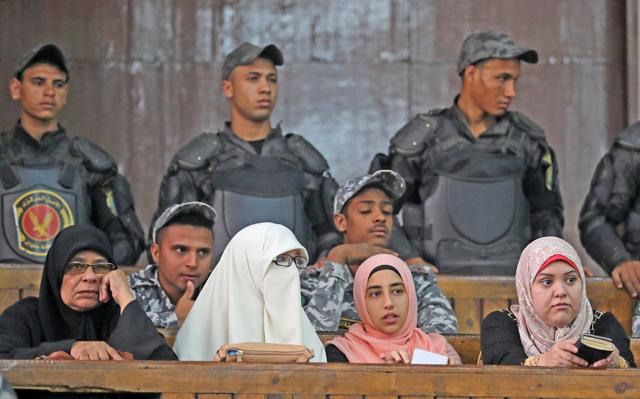You are here
Egyptian court delays verdict in mass trial over Rabaa sit-in
By Thomson Reuters Foundation - Jun 30,2018 - Last updated at Jun 30,2018

Family of ousted president Mohamed Morsi react in front of policman during a verdict session in a case against 739 people involved in a 2013 sit-in in Cairo, Egypt, on Saturday (Reuters photo)
CAIRO — An Egyptian court on Saturday delayed a final ruling in a case against 739 people involved in a 2013 sit-in protest that was broken up by security forces, saying defendants could not be transferred to the court due to “security concerns”.
The case, which involves top leaders of the banned Muslim Brotherhood, including the group’s leader Mohamed Badie, relates to a 2013 sit-in at Cairo’s Rabaa Square in support of Islamist president Mohamed Morsi after the army toppled him.
Some of the defendants, including an award-winning photojournalist, could face the death penalty if convicted on charges ranging from murder to incitement to violence. International rights groups have condemned the trial.
“The idea that more than 700 people could all stand trial together in one day, all facing the death penalty in what is clearly a grossly unfair trial that violates Egypt’s own constitution beggars belief,” said Amnesty International’s North African campaigns director Najia Bounaim.
Hundreds were killed when security forces broke up the Rabaa protest and another one in Giza, in one of the bloodiest events in Egypt’s recent history. Foreign governments and rights groups have condemned the use of force to disperse the demonstrators.
Cairo has defended its actions, saying it had given protesters the opportunity to leave peacefully and claiming that armed elements within the Brotherhood initiated the violence.
The Cairo Criminal Court had been expected to issue its final verdict in the case on Saturday, the anniversary of mass protests against Morsi’s rule in 2013 that prompted the army to move against him. A judge said security concerns had stopped the defendants being transferred to the court and set a new hearing for July 28.
Two of Morsi’s sons were at the hearing, in which one of their brothers is a defendant, witnesses said.
Photojournalist Mahmoud Abu Zeid, also known as Shawkan, who was arrested as he took pictures of the sit-in’s dispersal, is accused of belonging to a banned group and possessing firearms. He denies the charges.
International rights organisations, including Amnesty International and The Committee to Protect Journalists, have repeatedly denounced Shawkan’s imprisonment and urged Egyptian authorities to drop charges against him. Amnesty says he was imprisoned merely for doing his job as a photojournalist.
Authorities outlawed the Brotherhood and designated it a terrorist organisation after Morsi was ousted.
They also dissolved its Freedom and Justice Party, and arrested thousands of its supporters before banning protests in a crackdown by President Abdel Fattah Al Sisi’s government that rights groups say has muzzled freedom of expression.
Related Articles
CAIRO — An Egyptian court Saturday sentenced to death 75 people, including Muslim Brotherhood leaders, and referred what was the largest sin
CAIRO, Egypt — An Egyptian court upheld on Saturday a life sentence against Mohamed Badie, the leader of the banned Muslim Brotherhood, over
CAIRO — An Egyptian court on Monday upheld death sentences for 12 Muslim Brotherhood members, including two senior leaders of the outlawed I














